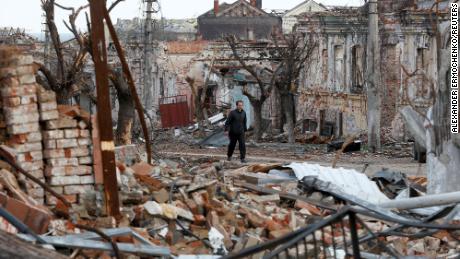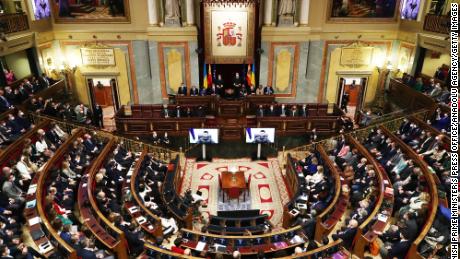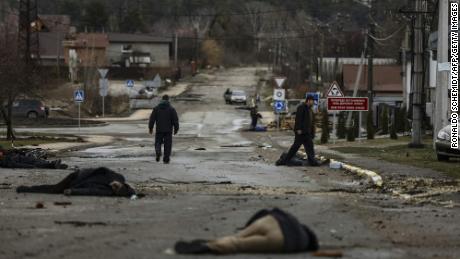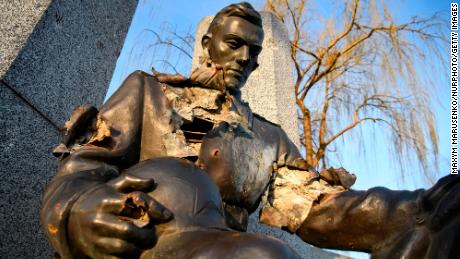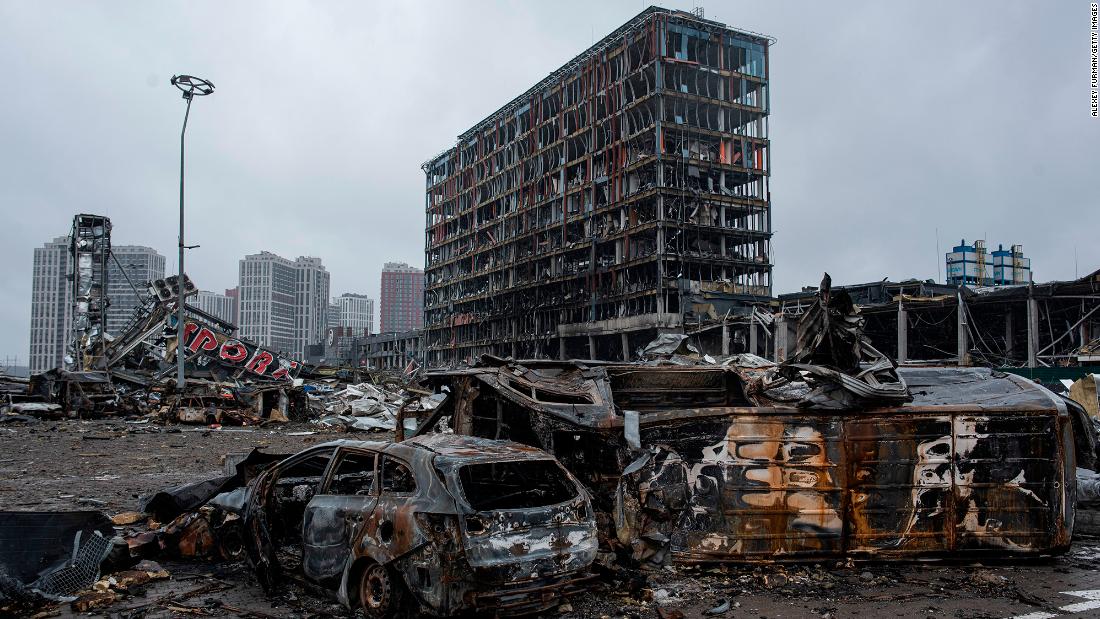
Since Russia’s invasion on February 24, Ukrainian writer and historian Olena Stiazhkina has recorded these snapshots of daily life — some witnessed, others taken from news stories, a few treading the line between imagination and reality — in a war diary.
It’s not the first time Stiazhkina has faced a war on her doorstep, having already fled fighting in Donetsk, in 2014. Now living with her young family in Kyiv, the author refuses to flee her home a second time, staying in the capital to volunteer with the civil defense.
A little over two months into Russian President Vladimir Putin’s invasion, Stiazhkina shares a selection of her diary entries here.
DAY 6 OF WAR
March 1. A friend in Mariupol tells me this story.
The mother of a little girl from Mariupol who was killed by a Russian rocket understood everything immediately. The doctor tried to resuscitate her, the little girl from Mariupol, hoping for a miracle.
And then the doctor screamed louder than all the air-raid sirens in the world put together. His scream was terrifying: “Damn you! Damn you!” And the mother fell silent forever.
Russia is taking its revenge on Ukraine for our freedom, for Europe and for the chant that the Kharkiv football fans invented back in 2014, when Moscow first invaded Ukraine: “Putin is a d**khead … La la la la la la.”
DAY 8
March 3. Watching this conversation between my friends’ family.
Little Serhii squats down and growls at his dog. His mother asks, “Why did you do that?”
“He’s a Russian tank and I’m stopping him.”
“Our dog is Ukrainian. Say sorry and then maybe nominate one of your toys as Putin, OK?”
A few minutes later, grandma appears in the room: “Serhii! Take that frog out of your mouth!”
“It’s not a frog, it’s Putin, and I’m eating him!”
“Is he clean at least?”
“Oh, come on grandma, do you really think Putin can be clean?”
DAY 15
March 10. Russian symbolism.
The Matrioshka — Russian nesting dolls — is one of the most apt symbols of Russia. One emptiness inside another. Emptiness after emptiness. The last figure is a tiny, cramped wooden doll, inside of which, instead of emptiness, there is a lethal bullet.
DAY 22
March 17. Another terrible story from Mariupol, told to me by a friend.
A woman is leaving Mariupol, which has been shelled for three weeks, via a long-awaited humanitarian corridor. She has her child with her. And the body of her husband. The woman miraculously managed to keep her car in working order. It is dented all over and full of holes from bullets and shrapnel, but it still works.
The woman puts the child in the front seat and then tries to put her husband into the back. People around her ask her to stop and leave the body behind. She screams at them, she wails, she wrenches herself free from their caring hands and tries in vain to shove the stiff, dead body of her husband into the car.
Then she calms down. Everybody thinks that she has finally given up. But no. She puts her arms around the body, she kisses it, she apologizes to it, and then drags him to the back of the car and loads him into the trunk.
“Don’t come near me! Don’t come near me! He’s all I have … I’m not giving him up.”
DAY 25
March 20. A news story.
“Mum, I killed a little boy.”
“Well, but your side is also suffering losses, isn’t it?”
They’re not suffering losses. Everything was lost and killed a long time ago — mothers, fathers, grandparents. And now they are burying their sons in our land. And there’s nothing more to say.
DAY 33
28 March. Images on social media.
People are writing the names, dates of birth, and telephone numbers on the backs of their children. In English, Russian and Ukrainian. Those who are already sitting in basements and hope for nothing more than the survival of their children write directly on their children’s bodies.
Those who are preparing to move themselves to the basement write the information on a piece of paper, which they put into a plastic wallet and attach to the collar of the child’s coat or jacket.
DAY 43
April 7. Another news story.
In the areas that have been liberated and cleared of mines, people have started to sow their crops. And to work in their gardens. The earth is breathing. It wants to give birth. It can give birth.
DAY 46
April 10. Volunteering in Bucha, after the expulsion of the Russians.
A small cemetery next to the entrance to an apartment block. On some of the graves there are crosses made from broken chairs. On others the crosses are formed from stones, paving slabs, or fragments of damaged walls laid out on the soil. This is Bucha, Borodianka, Irpin. Some of these cemeteries are larger, some are smaller, with only two or three graves.
Next to the entrance sits an old man. He smokes, looks up at the sun, squints his eyes. Then he says: “Not a scratch on me, but they are here.”
“We’ll rebury them. For sure …”
“No,” he says, “I won’t allow it … When I die, you can take them all. Look, there’s Ihor from the third floor, and his wife is here, she was a troublemaker, God forgive me for saying so. And here’s my wife. Forty years together. There’s no cross on the one behind her because he was Jewish — the director of the school, Stepan. Where the rest are, I don’t know.”
He smokes. He looks up at the sun. He squints his eyes because the tears are quietly welling up in them.
“They look after me. And I look after them … I won’t give them up!”
DAY 50
April 14. Walking in a changed city.
The 50th day of February. When I was a child, they used to tell me that February was the shortest month of the year.
About monuments. The monument to the Ukrainian Baroque philosopher Hryhorii Skovoroda in the Podil district of Kyiv has been given quite a makeover. Sacks are piled up around him and covered up with flat wooden boards. Between the boards there is a gap. Skovoroda looks through the gap and seems to be about to deliver a modified version of his famous phrase: “The world chased me but never caught me. And you won’t either.”
You get the impression that during the night-time curfew he jumps off his pedestal and goes for a stroll around the city. Because each morning he has this cheeky, roguish expression on his face.
The Archangel Michael in Borodianka survived. Just one bullet hit the monument, in the head. His left hand still holds his sword, but the cross has fallen out of his right hand. Where there is no cross, there is no forgiveness.
A sculptural composition: a little boy and a little girl reading a book, in Kharkiv. For the moment, it’s still in one piece. But both figures have multiple bullet holes. There’s no blood. They are made of stone. The boy and the girl are shot through like a sieve. But they are reading the book, and now rays of sunlight pass through them. Like the souls of the children the Russians have killed.
DAY 53
April 17. What my eyes have seen.
Now we have the chance to understand first-hand whether [German philosopher] Theodor Adorno was right when he said that, “to write poetry after Auschwitz is barbaric.” I don’t know whether, after the event that we call “Bucha” but which in fact has dozens of other names, I will be able to write anything.
Everything I’ve written up until now feels like flat words and singed letters with airless space between them.
DAY 55
April 19. From the history books.
We would never have been able to hold out were it not for Poland, Lithuania, Great Britain, the US, Slovenia, Czechia … were it not for all of Europe, Australia, Japan. Were it not for almost everybody. We will always be grateful.
However, the words of [Holocaust survivor] Elie Wiesel will always be with the inhabitants of Bucha, Irpin, Mariupol, Izium … All the Ukrainian cities that the Russian army has essentially turned into death camps.
And much like Wiesel, they might ask the world: Why so late?
